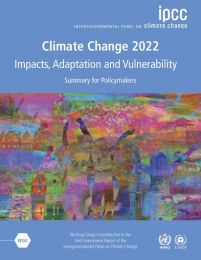II part of the IPCC Report - CLIMATE CHANGE 2022: Impacts, Adaptation and Vulnerability
The second part of the IPCC Report on Climate Change 2022: Impacts, Adaptation and vulnerability was published on 28th February 2022. The Working Group II contribution to the IPCC Sixth Assessment Report assesses the impacts of climate change, looking at ecosystems, biodiversity, and human communities at global and regional levels. It also reviews vulnerabilities and the capacities and limits of the natural world and human societies to adapt to climate change.
The report builds on the Fifth Assessment Report of the IPCC and three Special Reports.
This report recognises the interdependence of climate, ecosystems and biodiversity, and human societies and integrates knowledge more strongly across the natural, ecological, social and economic sciences than earlier IPCC assessments. The assessment of climate change impacts and risks as well as adaptation is set against concurrently unfolding non-climatic global trends e.g., biodiversity loss, overall unsustainable consumption of natural resources, land and ecosystem degradation, rapid urbanisation, human demographic shifts, social and economic inequalities and a pandemic.
The concept of risk is central in this report. A risk framing and the concepts of adaptation, vulnerability, exposure, resilience, equity and justice, and transformation provide alternative, overlapping, complementary, and widely used entry points to the literature assessed in this report.
The vulnerability of exposed human and natural systems is a component of risk, but also, independently, an important focus in the literature. Approaches to analysing and assessing vulnerability have evolved since previous IPCC assessments. Vulnerability is widely understood to differ within communities and across societies, regions and countries, also changing through time.
Adaptation plays a key role in reducing exposure and vulnerability to climate change. Adaptation in ecological systems includes autonomous adjustments through ecological and evolutionary processes. In human systems, adaptation can be anticipatory or reactive, as well as incremental and/ or transformational. The latter changes the fundamental attributes of a social-ecological system in anticipation of climate change and its impacts. Adaptation is subject to hard and soft limits.
Resilience in the literature has a wide range of meanings. Adaptation is often organized around resilience as bouncing back and returning to a previous state after a disturbance. More broadly the term describes not just the ability to maintain essential function, identity and structure, but also the capacity for transformation. This report recognises the value of diverse forms of knowledge such as scientific, as well as indigenous knowledge and local knowledge in understanding and evaluating climate adaptation processes and actions to reduce risks from human-induced climate change. The term climate justice, while used in different ways in different contexts by different communities, generally includes three principles: distributive justice which refers to the allocation of burdens and benefits among individuals, nations and generations; procedural justice which refers to who decides and participates in decision-making; and recognition which entails basic respect and robust engagement with and fair consideration of diverse cultures and perspectives. Adaptation plays a key role in reducing exposure and vulnerability to climate change. Adaptation in ecological systems includes autonomous adjustments through ecological and evolutionary processes. In human systems, adaptation can be anticipatory or reactive, as well as incremental and/ or transformational. The latter changes the fundamental attributes of a social-ecological system in anticipation of climate change and its impacts. Adaptation is subject to hard and soft limits.
Prognosis for Europe
The report identifies four key threats to the European continent:
- heat and its effects on ecosystems and human health (including higher mortality),
- water shortages,
- crop shortages due to droughts and heat,
- rise in sea level and floods.
This report constitutes a warning against the consequences of lack of action. It shows that climate change is a serious and growing threat to our well-being and to the health of our planet. It also shows that the actions taken today determine how people will adapt to climate change and how nature will respond to growing climate threats.


